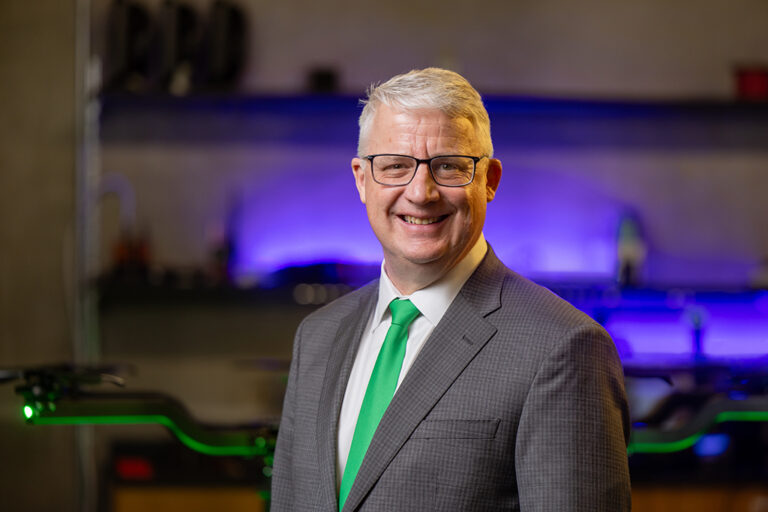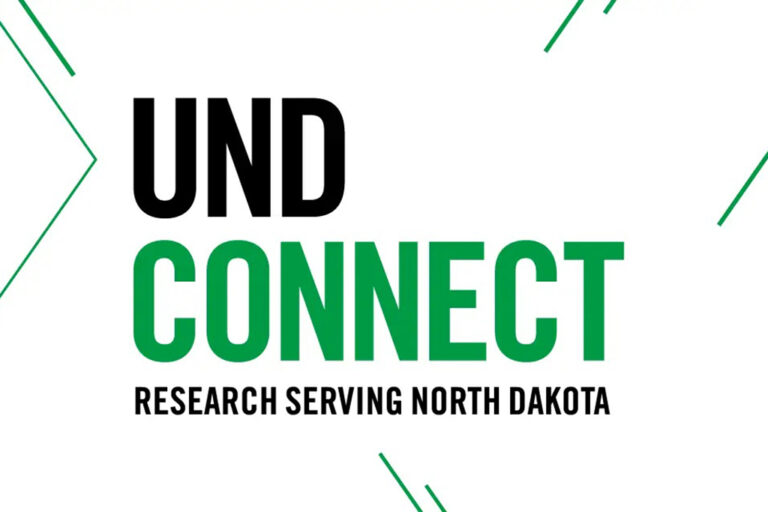On the leading edge
UND School of Electrical Engineering and Computer Science students burst into research early

Prakash Ranganathan said a significant number of first-year university students are so overwhelmed by the academic process that they don’t realize the world of research is an option for them from the start.
“This is a tremendous opportunity for the adviser to help open doors to a research experience,” said Ranganathan, an assistant professor in the School of Electrical Engineering and Computer Science (SEECS) and director of Cyber Security education at UND. “By explaining the process and available employment opportunities, academic advisers can help demystify the procedure and ignite a passion for research.”
And that is exactly what Ranganathan has been doing within his own division at UND and with great success.
A team of SEECS students, many undergrads, from Ranganathan’s research group, recently published 15 peer-reviewed papers and review articles on a wide range of topics, including cyber security, social engineering attacks and impacts, GPS spoofing and exploitation, demand-forecasting for electricity pricing, and smart-home vulnerabilities.
The work of the SEECS undergraduates also has led to a number of research conference appearances and published pieces in academic journals.
“Engaging in the unique opportunities offered in this publishing journey has broadened my perspective on various security issues and introduced me to the field of research,” said Jason Pollack, who lives in New Mexico and is a UND distance learning student in the SEECS.
In demand

Over the summer, SEECS students attended the 2018 World Congress Computer Sciences Conference in Las Vegas, the largest academic gathering for computer sciences students and faculty. Also UND students attended the IEEE General Power Meeting in Portland, Ore., the world’s largest technical professional group dedicated to advancing technology for the benefit of humanity; as well as CyberCon 2018, Drone Focus 2018 in Fargo, and the UAS Summit in Grand Forks.
All this activity is making UND’s SEECS fertile ground to recruit grad students.
Some of Ranganathan’s students are currently pursuing graduate school offers at UND, Princeton University, Worchester Polytechnic Institute, and the University of Minnesota, just to name a few.
“I’ve built, programmed and flown UAVs; helped grow a project from two students to 15; participated in competitive grant writing; and traveled to an international engineering and computer science conference,” said Joseph Schwalb, a junior majoring in UAS studies at UND, originally from Irvine, Calif. “The experiences I’ve had with (Ranganathan), in the Data Energy Cyber and Systems Laboratory, and the engineering community have had a major impact on my decision to pursue a graduate degree in computer science.”
Ranganathan’s students, who are exposed early to state-of-the-art research problems, also have easily found co-ops and internships that often lead to full-time careers with companies, such as 3M, IBM, Northrup Grumman, United Technologies, Rockwell Collins Corp., Minnkota Power, National Labs and many more.
“Working on research as an undergraduate has reinforced my learning and provided me an environment to learn valuable group working skills,” said David Johnson, a computer science senior from Halstad, Minn. “These skills are cannot be learned exclusively in the classroom and they’ll ease the transition into a professional work environment.”

Meaningful impact
Martin Pozniak, a senior electrical engineering student from Elk Grove, Ill., like the meaningful impact that he has on real-world projects in Ranganathan’s labs.
“We work on projects that matter and that will bring value to industries far and wide,” he said. “From Smart Grids and powering our cities to UAV swarms and protecting our airspace – we do it all.”

Ranganathan contends that students who participate in important research work early in their academic careers also tend to score better on classroom exams.
This academic success spills over to the collaborative side of the research taking place among students in his labs. It’s experience that will serve them well whatever their futures hold.
“The nature of research today is such that interdisciplinary teams are becoming the norm,” Ranganathan said, “and gaining firsthand experience in teamwork should be promoted in the undergraduate education.”

Funding for the research activities of Ranganathan’s students come from a variety of sources, including the National Science Foundation, UND College of Engineering & Mines Dean’s Office, Wells Fargo Foundation and Rockwell Collins Corp.


